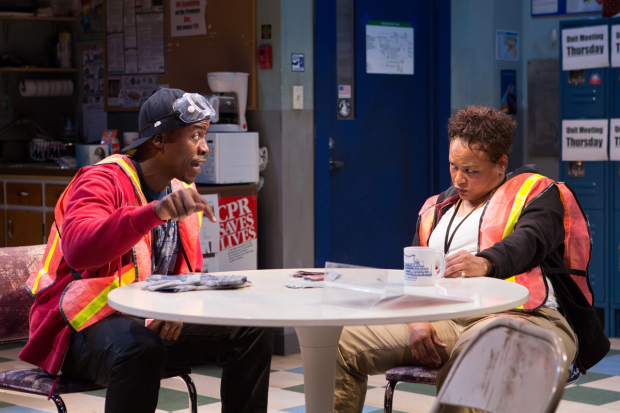Skeleton Crew

(© Teresa Wood)
Americans usually associate Detroit with unforgettable music rather than unforgettable drama, but playwright Dominique Morisseau intends to change that. A native of the city, she has written a trilogy of plays that reflect it in different eras. The third play, Skeleton Crew, is receiving a polished Washington, D.C., premiere at Studio Theatre.
Skeleton Crew is set in the winter of 2008 at one of the last small auto-stamping plants in Detroit. All its action is contained in the break room, where workers punch the clock, hang up their coats, and stash their valuables. The characters of Skeleton Crew include three workers and their manager, all at different stages of life.
Faye is a year away from retirement; if she is fired now, her pension will be much less than if she can work into next year. Shanita is a single, very pregnant young woman who is fiercely independent and loves contributing to an industry that makes something useful. Dez is a fast-talking young man who has a crush on Shanita and a desire to start his own auto parts business. Reggie, a young man who is their manager, has a wife, a family, and a house, so he can't afford to lose his job any more than his workers can.
All four characters are badly affected by continual rumors that the plant may shut down. Faye is the union rep, but she is afraid to buck the bosses at the plant. She gets Reggie to stand up for Shanita, with disastrous results. To make matters worse, someone is sneaking into the plant every night and stealing material. Guards are hired, and everyone is a suspect. An atmosphere of wariness spills over into the break room and causes explosions of mistrust.
Caroline Stefanie Clay is perfect in the central role of the straightforward Faye, whose answer to the "No Smoking, Faye!" sign in the break room is to light up a cigarette. But for all her toughness and refusal to follow rules, Faye has a core of tenderness. She looks out for Shanita, bringing her a book of baby names and making coffee for her every morning. And it was Faye who originally got Reggie his job.
Shannon Dorsey is excellent as Shanita, who pretends to have a hard shell around her to fend off Dez and get through the challenges of the day, whether on the floor of the plant or on the highway getting to work. Dorsey is also very good at showing that there is an interior, sensitive side to Shanita when she comes into the break room one day in tears, refusing to talk.
Jason Bowen is delightful as Dez, offering a particularly entertaining presence whether he is flirting with Shanita or enjoying the food she prepares for him. Tyee Tilghman is especially good as Reggie, who, for his part, presents the grim situation that he and his workers face in reconciling themselves to the dying automobile industry.
Patricia McGregor directs Morisseau's well-written script in such a way that it becomes a funny, vibrant expression of larger moral issues: What determines how good a worker is? If two workers are compared in the face of downsizing, what criteria decide which one stays and which one goes?
Tim Brown's set shows all the trappings of a break room, from the sofa and lockers to the coffeepot and even a space heater. The outlines of trucks can be seen stage right, indicating the floor of the factory. Between scenes, lighting director Nancy Schertler and sound director Everett Elton Bradman make huge arcs of realistic welders' sparks fly from that factory floor. Costume designer Marci Rodgers gives colorful sweater-and-jeans sets to Shanita and plainer attire to Faye and Dez to go under their coveralls. Only Reggie gets a white collar and tie. The design elements are bookended by Bradman's fabulous sonic collage of Motown hits that are played before and during the show, ending in Stevie Wonder's classic "Living for the City."
Although Morisseau keeps the focus of her writing on the auto industry, she covers a lot of territory in Skeleton Crew, including a searing look at the politics of work, the emotional importance of labor, and even the relationship of work to patriotism in America today.












